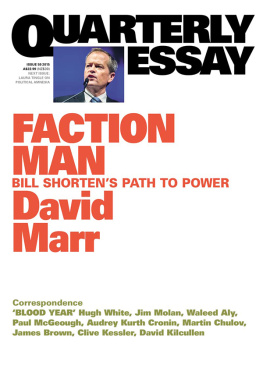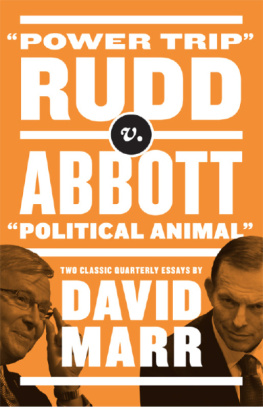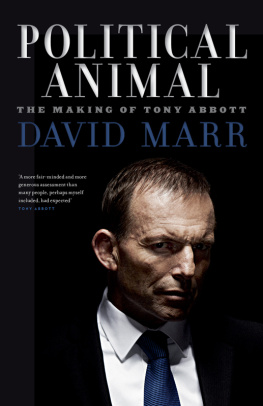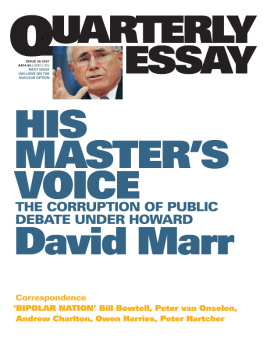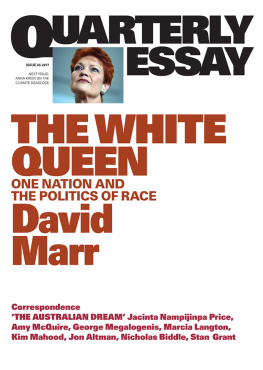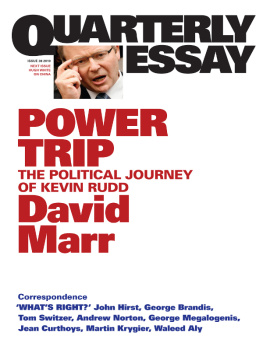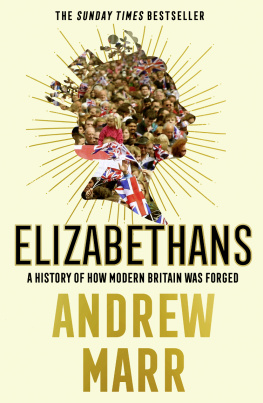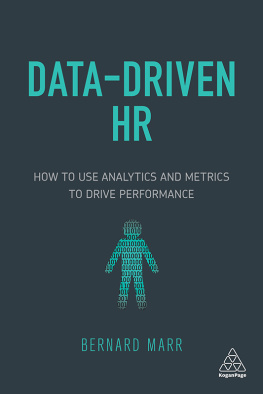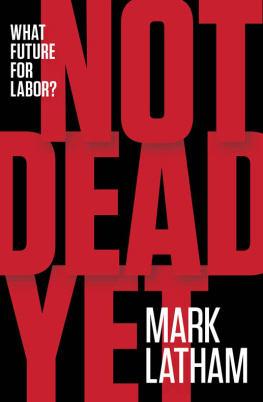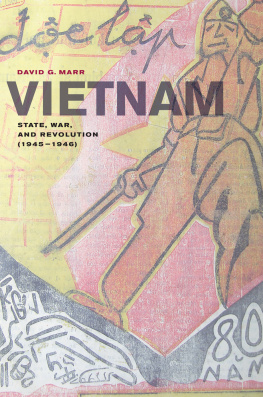Quarterly Essay
Quarterly Essay is published four times a year by Black Inc., an imprint of Schwartz Publishing Pty Ltd. Publisher: Morry Schwartz.
ISBN 978-1-925203-38-7 ISSN 1832-0953
ALL RIGHTS RESERVED.
No part of this publication may be reproduced, stored in a retrieval system, or transmitted in any form by any means electronic, mechanical, photocopying, recording or otherwise without the prior consent of the publishers.
Essay & correspondence retained by the authors.
Subscriptions 1 year (4 issues): $59 within Australia incl. GST. Outside Australia $89. 2 years (8 issues): $105 within Australia incl. GST. Outside Australia $165.
Payment may be made by Mastercard or Visa, or by cheque made out to Schwartz Publishing. Payment includes postage and handling.
Subscribe to Quarterly Essay:
www.quarterlyessay.com
Phone: 61 3 9486 0288
Correspondence should be addressed to:
The Editor, Quarterly Essay
3739 Langridge Street
Collingwood VIC 3066 Australia
Phone: 61 3 9486 0288 / Fax: 61 3 9486 0244
Email:
Editor: Chris Feik. Management: Sophy Williams, Caitlin Yates. Publicity: Anna Lensky. Design: Guy Mirabella. Assistant Editor: Kirstie Innes-Will. Production Coordinator: Sin Scott-Clash. Typesetting: Tristan Main.
FACTION MAN | Bill Shortens Path to Power |
David Marr |
THE NUMBERS: 24 TO 26 JULY 2015
By the third afternoon of the conference, the horse-trading was happening in plain sight. Mobs gathered on the floor of the auditorium. Emissaries went back and forth. Lone figures looked to their phones for answers. At the microphone, delegates from the boondocks poured their hearts out about aged care and the latest notion to defeat branch stacking. No one was listening. The real interest in the vast, spring-green auditorium of the Melbourne Convention and Exhibition Centre was elsewhere: not on the fate of gay marriage, the immediate cause of the commotion on the floor, but on a question that mattered for the entire Labor Party. Was Bill Shorten in control? So far at the national conference he had won every round. Pundits predicting his humiliation at the hands of the Left had been proved wrong, indeed ridiculous. He had had his way even on refugees: Australia under Labor would stay in the company of the least civilised nations on earth, pushing refugee boats back out to sea. But could he end the weekend with what he needed to consolidate his leadership of the Opposition: a near perfect score?
This is a man from nowhere. He built his career out of sight inside the union movement. Had he cut his teeth in parliament we would know him better by now. He became a public figure at Beaconsfield less than ten years ago and only edged into cabinet in the last years of Julia Gillards government. He has failed to emerge strongly as a leader since. The verdict of the focus groups is mixed. There is no great disagreement with what he does. He seems a safe pair of hands. Yet people still wonder what he stands for. Shortens story isnt familiar. The successful decade he spent at the head of one of the countrys biggest unions tends to be dismissed as a job, something he did while waiting to get into politics. He still has a faint halo from the Beaconsfield mining disaster, but he is also the plotter who brought down two leaders to clear his own way to power. The sight of Shorten talking on his phone outside a Chinese restaurant on the night of Rudds downfall is one of the most familiar images of the man. If recollected at all, his record as a minister in the Rudd and Gillard governments is remembered well. He is not thought to be making many mistakes as leader of the Opposition. But hes seen as a shape-shifter, driven entirely by politics. Yet the party is united behind him and nearly every poll taken since Abbott won office suggested Australia would welcome Labor back with open arms under Bill Shortens leadership. Now the contest has changed.
We are being transparent to the Australian people, he told the delegates to the 47th ALP National Conference, who gave themselves a standing ovation for being so brave debating difficult issues in the public gaze. When the count was called, the delegates held their passes in the air like schoolkids begging for attention. The place was a garden of dangling red lanyards. And Shorten was comfortably home on pushing back the boats. But he knew that already. He had done what he has so skilfully done ever since he put on long pants: gathered the numbers. The Maritime Union of Australia (MUA) and the Construction, Forestry, Mining and Energy Union (CFMEU) had broken from the Left to deliver him victory. God knows what debts must be paid. On the list might be safeguards for jobs; a seat or two in state upper houses; a place on a trade mission to China; and out on the fringe of one of the nations capital cities, someones daughter may become deputy mayor.
Thats how it works, and no one works the system better than Shorten. He is a master of the art of negotiation, a deal-maker of immense skill. He betrays without flinching. The career of this man of the Right is proof that Right and Left dont mean much anymore in Labor politics. I dont hate anyone in the Labor Party, he declares. Its not a completely amoral world. But you begin to realise over time that Right and Left arguments can get over-cooked. What were once mighty building blocs of the party are now unstable coalitions of the roughly like-minded. At the national conference, the CFMEU deserted the Left on the boats, and next day the National Union of Workers (NUW) broke with the Right to undermine Shortens position on marriage equality.
He set to work. He is not Bob Hawke, who sat above the fray, relying on his lieutenants to bring him the numbers. Shorten is hands-on. He uses his contacts, deep in the party. He believes they give him a better understanding of what Labor is thinking than any of his recent predecessors had. He goes right down the line. When he discovered, sometime in the morning, that the conference was shifting against him, he took out his phone. Labor MPs were allowed a conscience vote on marriage equality. Shorten wanted it to stay that way. But the Left was determined to make the policy like any other party policy binding on MPs. A collision between him and his deputy, Tanya Plibersek, was looming. He made calls. Faction leaders met. He twisted arms. The horse-trading spilled onto the conference floor. Around 4 p.m. a compromise was hammered out: marriage equality would remain a matter of conscience in this parliament and the next, but become binding on the party thereafter. Shorten pledged to bring marriage reform to the vote within 100 days of taking office. He faced down key opponents, that branch of the Catholic Church known as the Shop, Distributive and Allied Employee Union, the Shoppies. He and Plibersek put the compromise to the conference in the early evening and it was carried on the voices.
Nearly everything had gone his way over those three days in Melbourne. He had played the numbers superbly. His authority in the party had been showcased to the nation. And he could only have shared the relief of old faction warriors that the hours spent on this newfangled marriage policy had edged off the agenda the truly difficult issue facing Labor: rebalancing the power of the unions, the members and the machine. Shortens career is a product of the great conundrum of the party: the wretched state of democracy within.
Shortens body is not made for suits. His baggy frame sits on skinny legs. At factory gates in the old days he wore chambray shirts and bomber jackets. Theres something about the new uniform of coat and tie that suggests a plugger dressed for court. He has that great asset for a politician: a big, easy smile. But he affects a clumsy, serious face, creasing his brow in what photographers who trail him call the full wifi. Time and Canberra have taken their toll. In the seven years since he came to parliament, he has aged about twenty. At the time of the Ruddslide he cut a boyish figure. Now there is more head, less hair and not so much of the charm that once swept men and women off their feet. The accent is just right: educated and classless, part Xavier College and part Australian Workers Union (AWU). Its a highly serviceable political package but the question is: does it scale up from party leader to prime minister?

